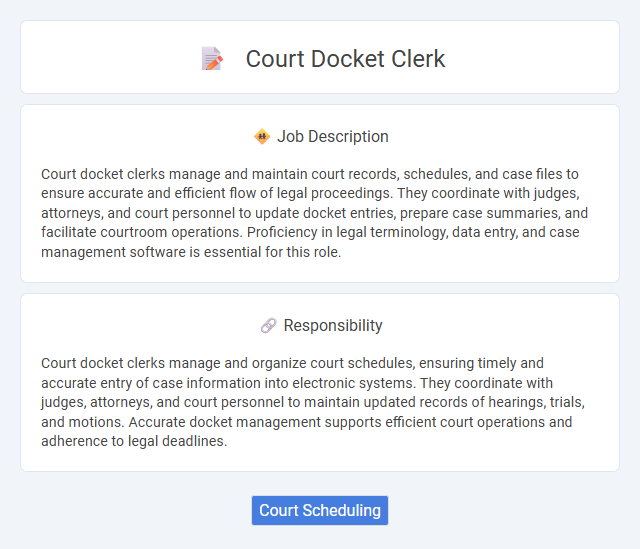
Court docket clerks manage and maintain court records, schedules, and case files to ensure accurate and efficient flow of legal proceedings. They coordinate with judges, attorneys, and court personnel to update docket entries, prepare case summaries, and facilitate courtroom operations. Proficiency in legal terminology, data entry, and case management software is essential for this role.
Individuals with strong organizational skills and attention to detail are likely well-suited for a Court Docket Clerk position. Those who prefer structured environments and possess good communication abilities may find the role aligns with their strengths. People who struggle with multitasking or high-pressure settings might face challenges in this job.
Qualification
Court Docket Clerks require a high school diploma or GED, with many employers preferring candidates who have an associate degree in legal studies or a related field. Strong organizational skills, attention to detail, and proficiency in legal terminology and court management software are essential for managing case files and court schedules accurately. Previous experience in a legal or administrative setting enhances a candidate's ability to efficiently handle docket entries, maintain records, and coordinate court proceedings.
Responsibility
Court docket clerks manage and organize court schedules, ensuring timely and accurate entry of case information into electronic systems. They coordinate with judges, attorneys, and court personnel to maintain updated records of hearings, trials, and motions. Accurate docket management supports efficient court operations and adherence to legal deadlines.
Benefit
Court docket clerk positions likely offer benefits such as job stability and comprehensive healthcare plans due to their essential role in the judicial system. Employees may receive retirement benefits and paid time off, contributing to long-term financial security and work-life balance. Opportunities for professional development and training could also be available, enhancing career growth within the legal field.
Challenge
A Court Docket Clerk likely faces the challenge of managing a high volume of case information with precision, as accuracy is critical to maintaining the integrity of court records. The role may also require adapting quickly to changes in scheduling and legal procedures while ensuring timely updates are made to the docket. It is probable that strong organizational skills and attention to detail are essential to overcoming these challenges effectively.
Career Advancement
A Court Docket Clerk manages and organizes court case files, ensuring efficient tracking and scheduling of legal proceedings. Mastery of legal terminology and courtroom procedures can lead to career growth opportunities such as Senior Clerk, Court Administrator, or Legal Assistant roles. Continued professional development through certifications and experience enhances prospects for advancement within the judicial system.
Key Terms
Court Scheduling
Court Docket Clerks manage court scheduling by organizing and maintaining accurate records of all case hearings, motions, and trial dates to ensure smooth courtroom operations. They coordinate with judges, attorneys, and court personnel to update dockets and resolve scheduling conflicts efficiently. Proficiency in case management software and knowledge of legal procedures are essential for optimizing court calendar accuracy and reducing delays.
 kuljobs.com
kuljobs.com